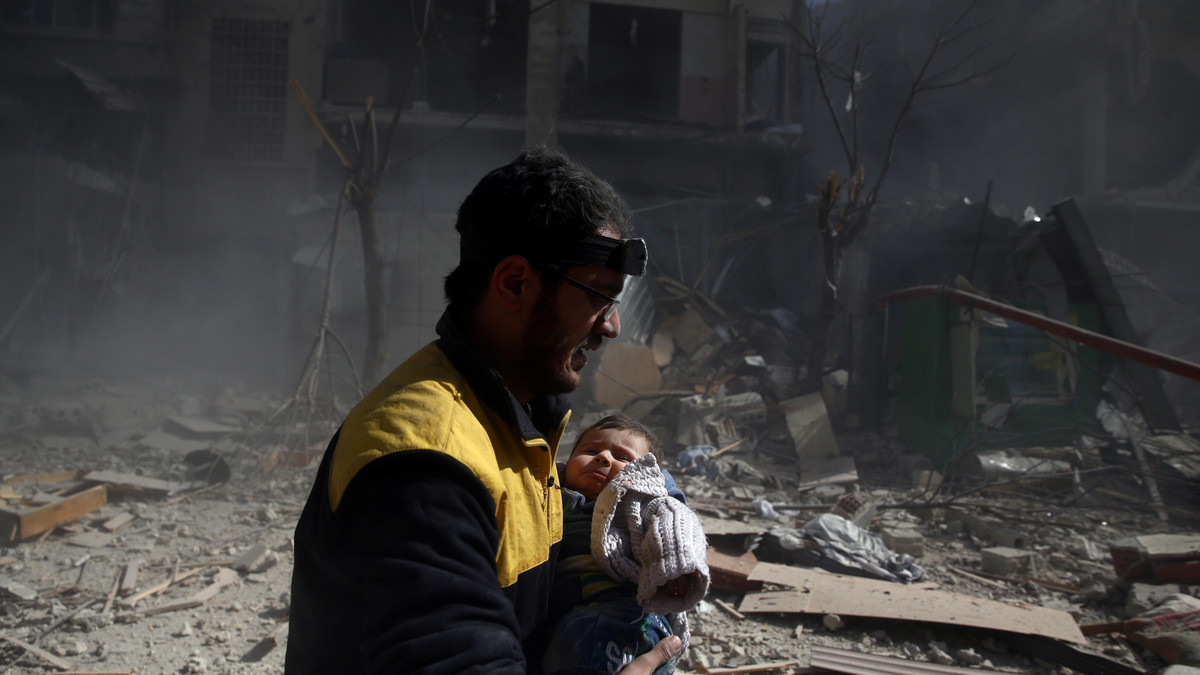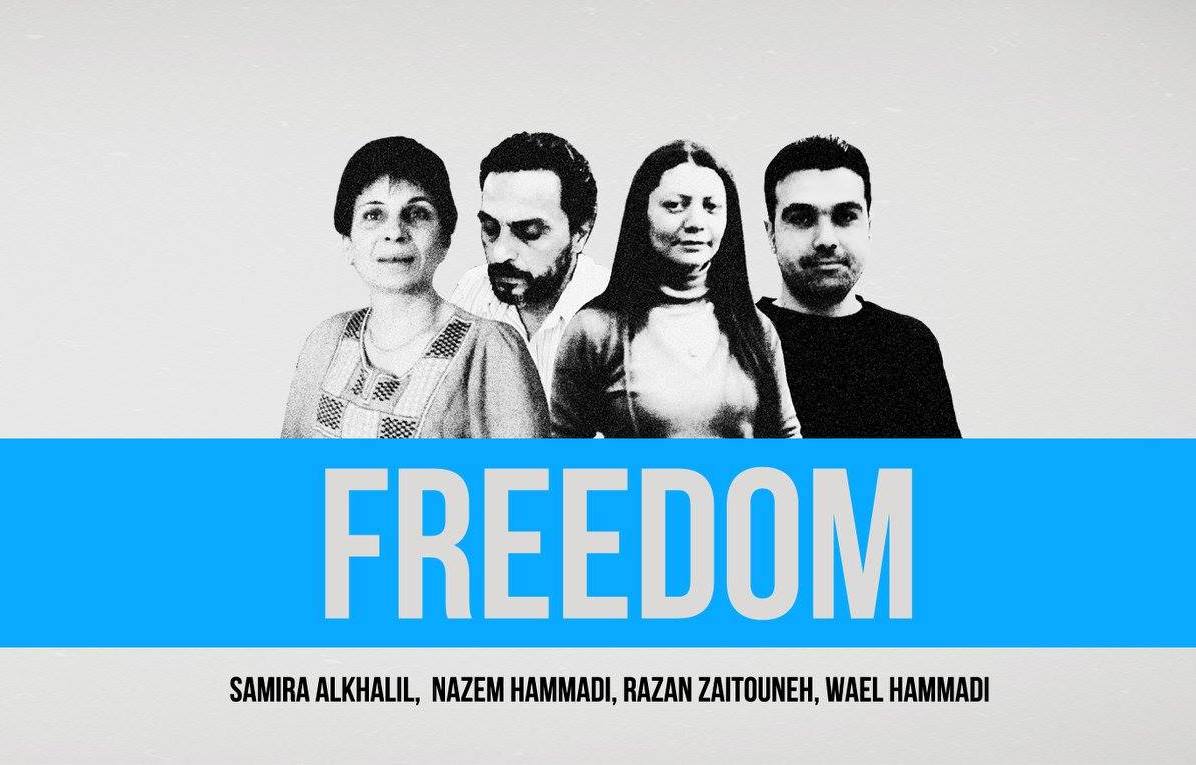A bitter harvest for civic work in Eastern Ghouta

George Mayala
June 11, 2018
Once the Ghouta area, southwest of Damascus, was removed from the regime’s control, civil leaders began developing basic organizational structures that evolved and became more sophisticated over time through local associations, organizations and councils.
Among these new structures are the institutions of the opposition military factions, civil society organizations and local councils established through a genuine electoral process. They have not been perfect, but nevertheless they were received positively by many, especially considering that these democratic and electoral experiences are recent developments and constitute a new experience for many Syrians.
These new entities have become an alternative to the Syrian regime’s authority, especially in the context of the suffocating siege and severe human suffering that has garnered media attention from around the world.
What remains of civil society
Unofficial figures estimate that since the start of the Syrian revolution, 160 organizations and associations have been established in the various cities and towns of eastern Ghouta. They have assumed the responsibility of providing services to the population. Their activities extend to all aspects of life from health care, education, humanitarian relief and civil affairs, to the difficult task of civil defense.
As the multi-year-long siege on Eastern Ghouta escalated, the efforts and activities of these organizations also increased. There were many confrontations between the leaders of these organizations and the military authorities in the area, as a result of the military authorities’ interventions in the work of civil society. These confrontations often led to the arrest of activists without cause and the protests against these factions.

When the regime regained its control over the Eastern Ghouta areas, many of these organizations had to close. The majority of civic workers and leaders were forced to leave the area to northern Syria, out of fear that they would be assassinated or arrested if they remained in the area, as had happened to others.
The human rights activist Hiba Awad (her name has been changed for security reasons) told Suwar that, “Very few activists dared to stay in the Ghouta area, because the majority of them were wanted by the regime since the beginning of the revolution. The regime had prepared lists many years ago to arrest or assassinate activists, as human rights activists are the most wanted individuals by the regime.”
She added that, “Some of those wanted by the regime weren’t from the Ghouta area but were from other areas in Syria. Ghouta was a safe haven from the security apparatus’s grip for them and they remained loyal to the people and their cause until the moment we all had to leave.”
Different organizations had differing experiences in preparation for leaving Eastern Ghouta. Some organizations’ offices were looted and the contents of their warehouses were stolen by people from Ghouta or by regime forces. For others, their employees were forced to flee to more secure areas as the regime’s forces regained control over more and more territory, leaving their offices as they were.
"Some organizations were able to escape with their papers and administrative files, in addition to their financial resources,” said the rights activist Aws Mubarak to Suwar, continuing that they had to “…leave years of bitter field work behind – years of siege, death and the daily targeting of civilian activists in a manner that the world has never witnessed before."
He added: "The organizations suffered many losses; some of them lost everything, especially the organizations working in the medical and relief fields, which lost all the organizational thought accumulated over the past few years. But others lost nothing, especially the organizations that primarily focused on promoting the values of democracy, freedom and human rights to the local people and those that monitored elections and governance and encouraged local communities to participate in the decision-making process."
On the future of these organizations, Mr. Mubarak told the magazine, “Some of them will cease from operating, while others will merge with other institutions. A number of them will continue to work by operating in other branches of the same organization in the Aleppo countryside."
"Despite the difficulties, there are serious efforts to continue operating,” added Mr. Mubarak, continuing that, “Some organizations are in the process of preparing new plans to integrate the newly arrived cadres into the northern branches. While others are also working on reestablishing their organizations from Eastern Ghouta in northern Syria, in order to continue their work in the areas they’ve been displaced to.”
Local councils
The experience of the local councils in rural Damascus was a vital step in strengthening the values of democracy and encouraging local community members to represent themselves within elected councils to fulfill their aspirations and desires. These local councils played a pivotal role in providing basic services and were able to gain the trust of the public through the development projects they implemented under siege conditions. They also prevented several abuses by the military factions controlling the region from happening. The councils also comforted various segments of the society while they were dealing with deaths and injuries, until they were evacuated from the area.
Mehran Ayyoun, the Damascus Provincial Governorate Council representative in Turkey, told Suwar, “Nearly 70 percent of the provincial council and its subdivisions, approximately 50 percent of the teaching staff and 70 percent of the medical staff of the governorate, were evacuated to northern Syria."
Over the previous period, local councils underwent a gradual decrease in funding and support for development projects that would strengthen the public’s resolve. Many observers considered the decrease in support as an indirect political pressure on the councils and the wider population to force them out of the area.
Addressing the decrease in funding, Mr. Ayyoun observed, “Support for the local councils in Ghouta has decreased significantly. Only a small number of projects that we’ve been working on in Al-Ghouta have received funding until the end of the year.” Adding that the Ghouta area in 2018 has, “…received only 20 percent of the funding it had received in 2015.”
“Our objective is to rebuild the educational and medical cadre and empower them in areas they are in,” said Ayyoun speaking about the future of the local councils, continuing that they “…will try to form committees and bodies to supervise the affairs of the displaced from Damascus’s countryside, each according to his region. I expect that once these organizational matters are completed, the local councils will be dissolved."
Activists reach areas under regime control
A small percentage of civil society activists preferred to remain in Ghouta at their own risk, including a group of doctors - who received guarantees from international parties that they would be able to continue living normally and continue their university studies - and some Syrians who played a role in the negotiation process for the agreement that allowed Syrians to exit the Ghouta area. However, the regime’s promises to these groups were soon broken. The regime forced two of the doctors to appear on Syrian state television to falsely testify and refute the allegation that the regime had used chemical weapons. They were also forced to repeat their statements at the headquarters of the Organization for the Prohibition of Chemical Weapons in The Hague, Netherlands.
However, human rights defenders have downplayed the effects of the testimonies of the medical doctors, as presented by the Syrian regime. "The doctors who were shown on state TV can no longer act as witnesses in front of the international investigation team and in international courts,” stated legal expert Ahmad Saifan to Suwar. He continued that this was because they “…revealed their identities, whereas in international investigations the identities of witnesses are concealed, such as in the Caesar files that revealed photographs of victims of torture in the regime's prisons.” He added, “Legally, their testimony contradicts the fact that there are dozens of victims and witnesses who have presented accounts contrary to the testimonies of the doctors."
"Both the judge and the prosecutor know that the Syrian regime, which is being accused of committing chemical warfare, is the one who brought these witnesses,” continued Mr. Saifan, adding that, “Their testimony won’t have any resonance except in some global media channels that support the Syrian regime or are allied with it."
Razan Zeitouneh and her friends
The kidnapping of Razan Zeitouna, the General Director of the Syrian office of the Violations Documentation Center, and her colleagues from the heart of the city of Duma, northeast of Damascus, was a major setback for Syrian civil society in general. Despite civil and political efforts, their fate has not been revealed. When the area fell to the regime, and as the military forces that had controlled the area began to retreat towards northern Syria, civil society activists called on the Islamic State - which was suspected of being responsible for their disappearance – to reveal the truth about what happened to them. Despite intensive efforts, campaigns and social media appeals, the case was never investigated. The case has remained unsettled and a major source of debate within Syrian opposition circles.

Since the regime’s take over of the area, revealing the truth about what happened has become increasingly complicated and difficult. It is not easy for an impartial investigation team to go to the area to investigate their disappearance, making the case a complex puzzle to be added to the list of violations against civilian activists.
Emergency appeals
Civic society organizations in Turkey and northern Syria were quick to respond to the needs and demands of the people of Ghouta, despite their limited capabilities.
Syrian activist Hiba Awad told Suwar, “Many youth groups welcomed us in Turkey, offering us what help they could afford to offer. We understand that the crisis is larger than everyone's ability to help. In fact, most of those who are trying to help us need aid themselves." She continued that this “…is what makes Syrians great, the wretched helping the wretched.”
In southern Turkey, the student body of Gaziantep – a youth group founded by Syrian students studying at the city’s university – organized special seminars entitled ‘Studying in Turkey for the people of al-Ghouta’ as an attempt to help those wishing to continue their education in Turkey. The seminars discussed the requirements to study in Turkey, scholarships opportunities and the procedures for applying to Turkish universities.
Another example is the ‘Ghouta initiative’, which was launched by Syrian activists to create awareness about the suffocating siege on the area so that the story of the siege is not forgotten following the evacuation of Ghouta’s population from the area. The initiative relies on social media to tell the story and through developing networks with activists around the world. Additionally, the initiative’s volunteers are working on a project that would help students who wish to continue their university education, a right they have been deprived of for many years.



